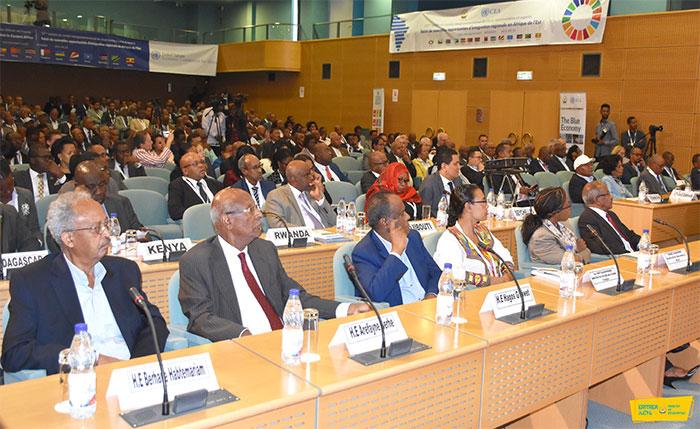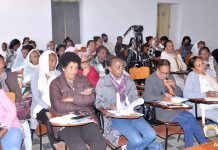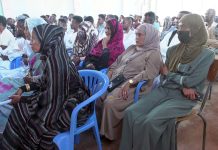
Africa-Press – Eritrea. Throughout the year 2019-2020 the world has been suffering from the threats of Covid-19 which has forced countries of the world to shift governance methods to tackle the pandemic and its impact on business. East African countries have been especially confronted with significant challenges as they have also been overwhelmed by locust infestation, flooding and other natural disasters this past year. To deliberate on finding ways to deal with the impacts of the disasters, East Africa’s policy makers conducted their 24th meeting of the Intergovernmental Committee of Senior Officials and Experts (ICSOE) from 24th to 25th November 2020.
The virtual meeting, which was organized by UN’s Economic Commission for Africa (ECA), was attended by fourteen East African states under the theme of ‘Economic and Social impacts of the Covid-19 Crisis on Eastern Africa: Strategies for Building- Back-Better.’
In his opening speech, Eritrean Minister of Foreign Affairs and Chair of the 23rd ICSOE Bureau, Minister Osman Saleh, thanked ECA for organizing the important meeting and commended East African countries for tackling back to back challenges that contested business and livelihoods of their people.
“The pandemic has become the biggest challenge of recent times confronting the ideals of humanity that bestows collective and shared responsibility beyond existing boundaries and political stance. In our region, the pandemic has been coupled with locust invasion and flooding with significant effect to development and people’s livelihood. Nevertheless, countries in our region were among the very first countries to take aggressive measures against Covid-19 through mandatory quarantine and have tackled the pandemic and its effects by mobilizing national capacities and stimulus packages wherever possible in the interest of social protection and macro-economic recovery” the Minister and Chair of ICSOE said.
Expressing great satisfaction over the fact that Eritrea hasn’t suffered from Covid-19 related fatalities to date, Minister Osman Saleh highlighted the importance of harnessing the potential of regional integration to eradicate the pandemic and stimulate the post pandemic economic recovery and develop it further. In this line, Minister Osman Saleh also called on member states to collectively reflect on ongoing experiences and challenges to be able to consolidate the region’s preparedness for future emergencies.
Government officials of the fourteen member states shared their experiences and deliberated on how they tackled their respective socio-economic issues during the ongoing pandemic. Representing Eritrea, Ambassador Tesfamicael Gherahtu shared Eritrea’s experiences during the pandemic.
In his address, Ambassador Tesfamichael commended Eritreans’ united efforts in dealing with the pandemic.
Based on the case studies of the countries’ socio-economic situations presented during the meeting, the conference ended by making further work plans moving forward. Ms. Nnenna Nwabufo, Acting Director- General of African Development Bank, highlighted the importance of regional coordination to improve and strengthen Africa’s economy, and member states agreed that the pragmatic plans and networks are essential moves that need to be taken in the effort to recover the economy in the post- pandemic era, while still focusing on the health security of the people.
Expressing his satisfaction that Eritrea has so far been able to contain the spread of the pandemic, Minister Osman Saleh said: “The overwhelming focus as priority remains people’s health with commitments to saving lives. As a result, our sub-region has the lowest Covid-19 cases in the continent. For the particular case of my country, Eritrea, it is a great satisfaction to say that it has been contained and we have zero recorded death to-date. The challenges are, however, of phenomenal proportion and consolidating the pragmatic national approaches remains critical. Nonetheless, it is imperative to harness the regional integration potential to eradicate and stimulate economic recovery and promote the development of our economies. In this vein, harmonizing effort, creating commentaries, promoting cooperation as well as sharing experience is a necessity.”
Representatives of member states as well as representatives of youth and women organizations, regional economic communities, civil societies, private sector associations, media and academia deliberated on what is nowadays a global challenge interfering with almost all socio-economic streams worldwide. The encounters might differ from one region to another, and this is where this regional meeting was held — to bring to the table timely issues and ways forward.
Since the 23rd ICSOE, the Bureau has worked on keeping strong liaisons with EAC to implement and consolidate recommendation drawn in last year’s communiqué. Chair of the Bureau, Minister Osman Saleh explained that the present session has maintained the essence and continuity of the previous session while highlighting the impact of the global pandemic and ways of overturning the challenges into opportunities for vital post Covid- 19 development prospects.
Government officials from Burundi, Comores, RD Congo, Djibouti, Eritrea, Ethiopia, Kenya, Madagascar, Rwanda, Seychelles, Somalia, South Sudan, Tanzania and Uganda took part at the virtual meeting.






